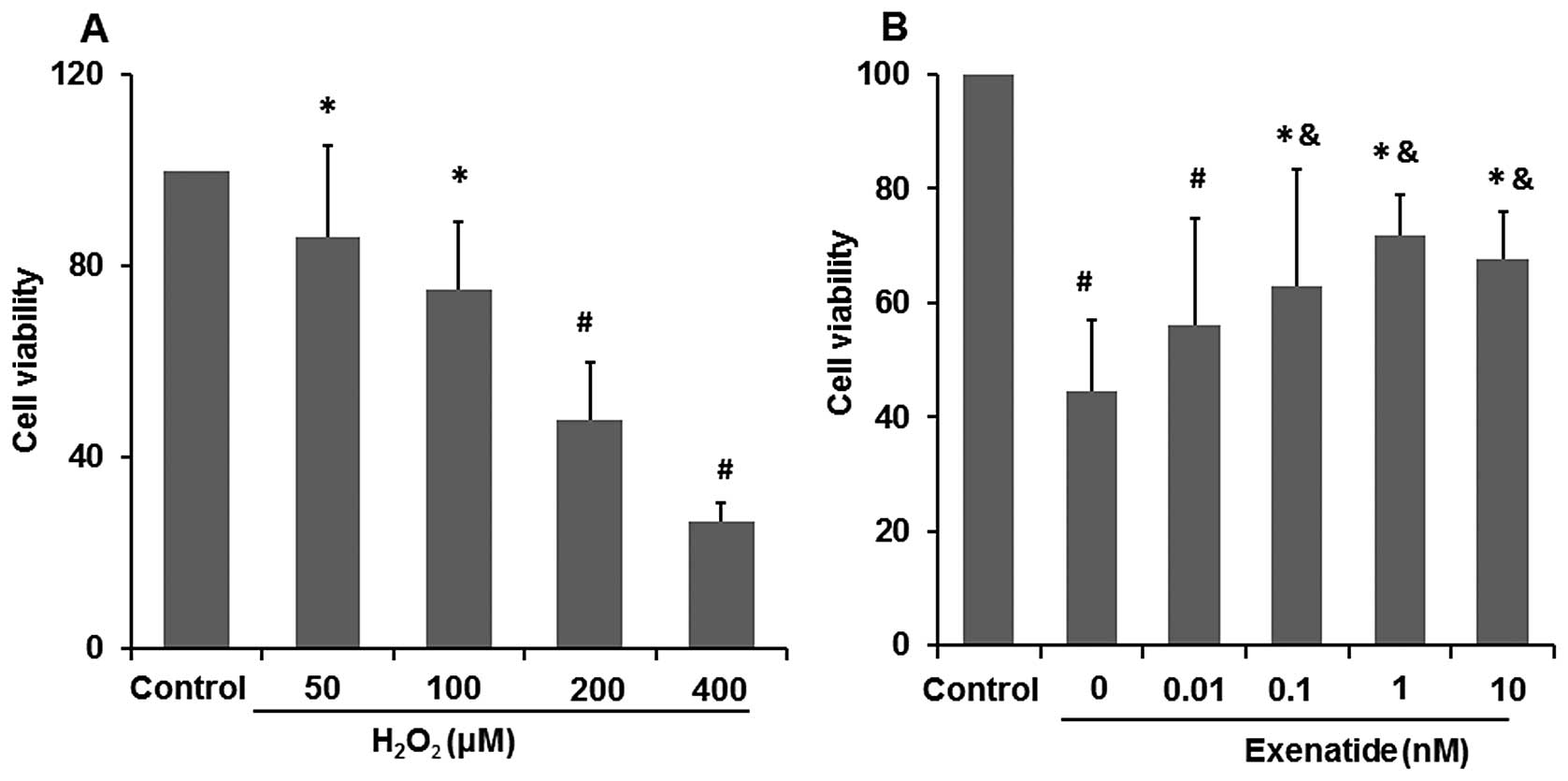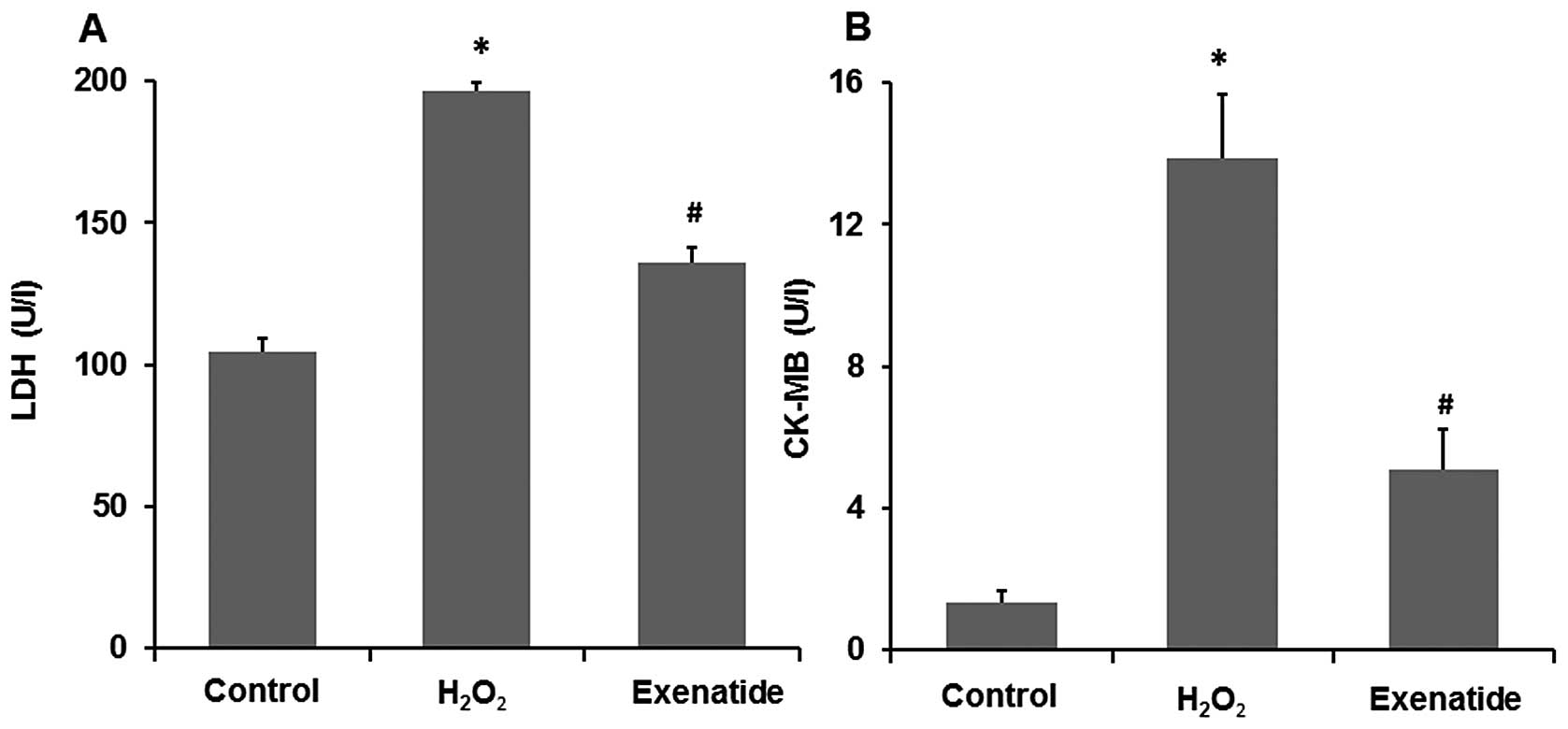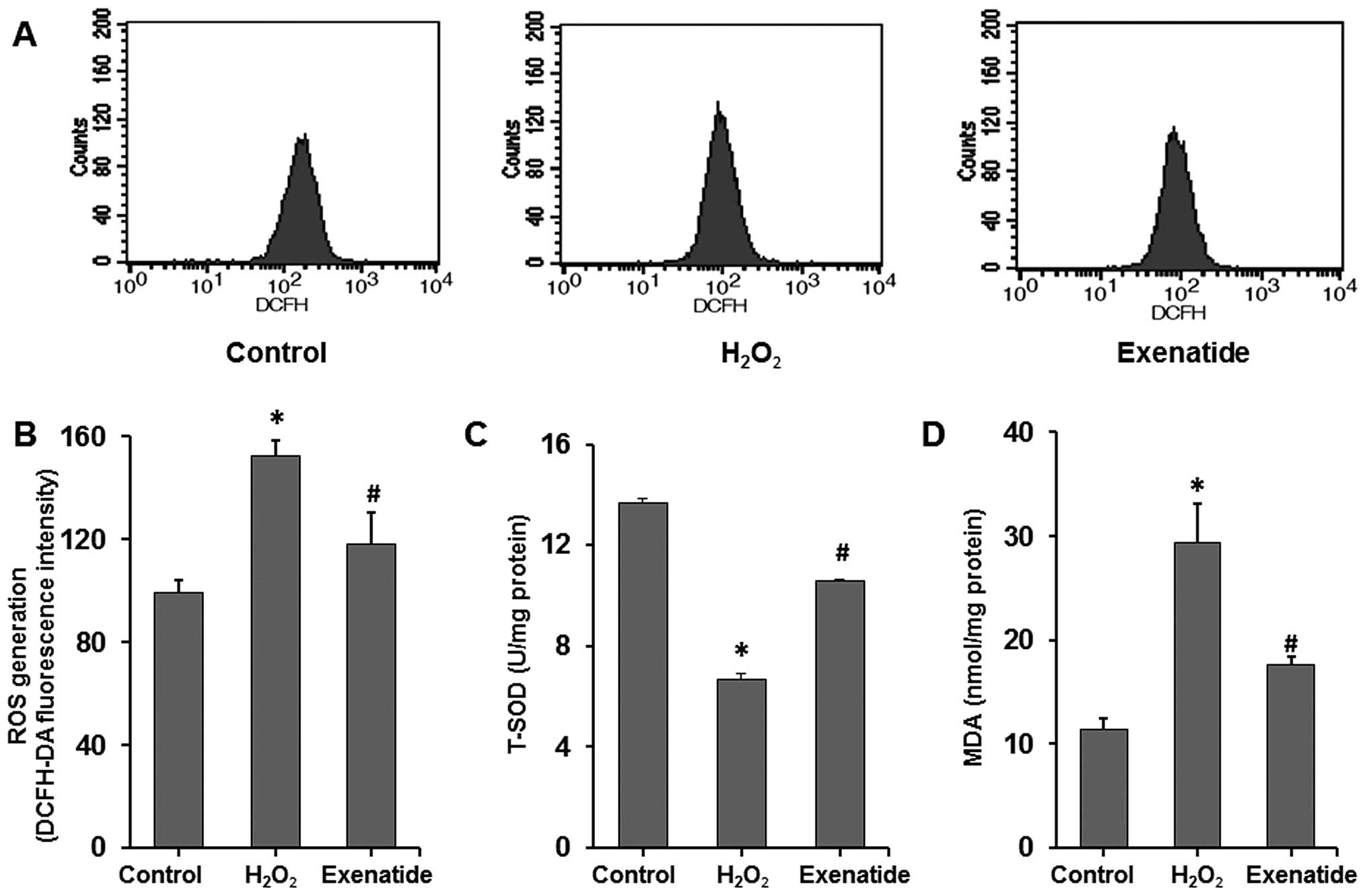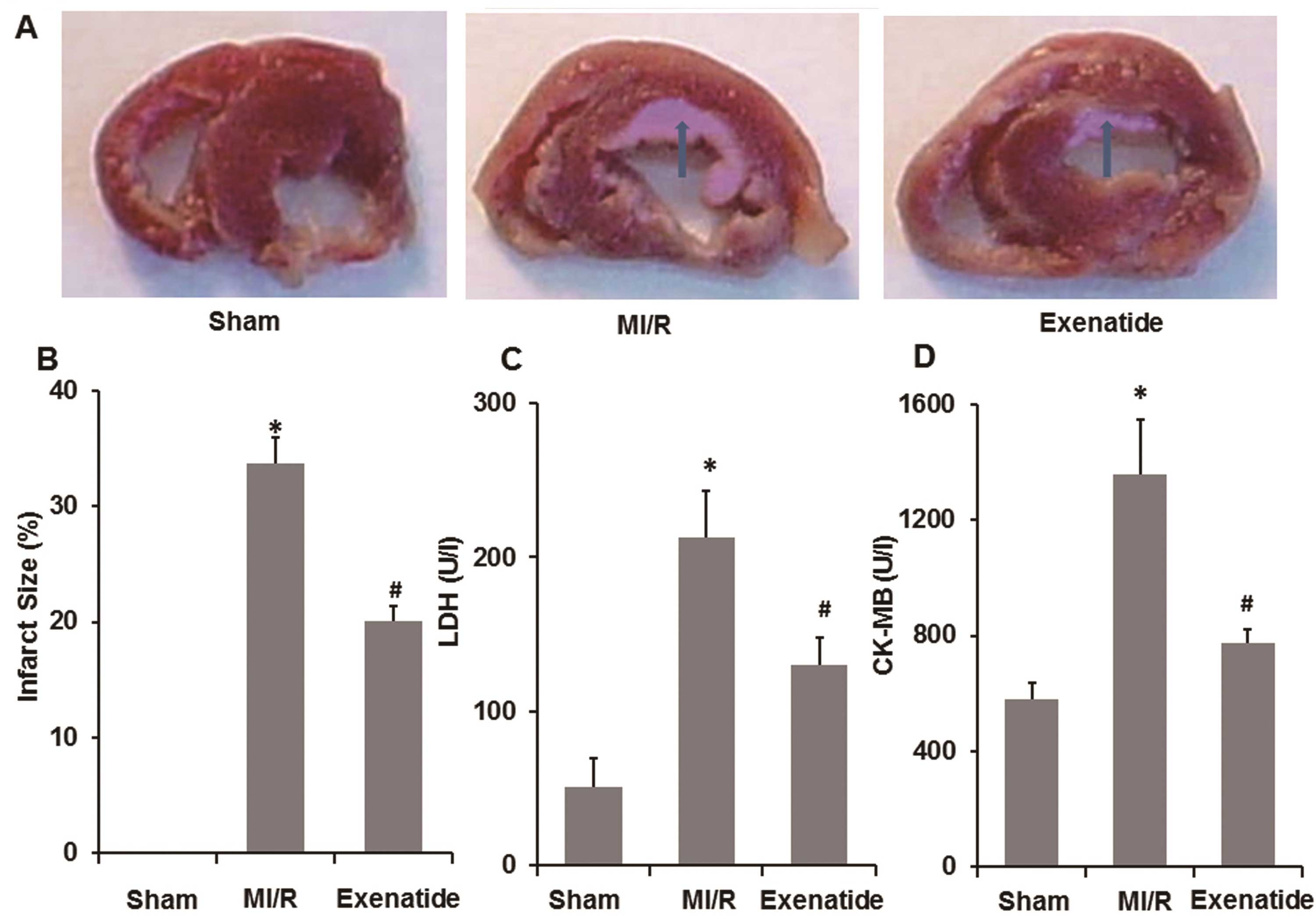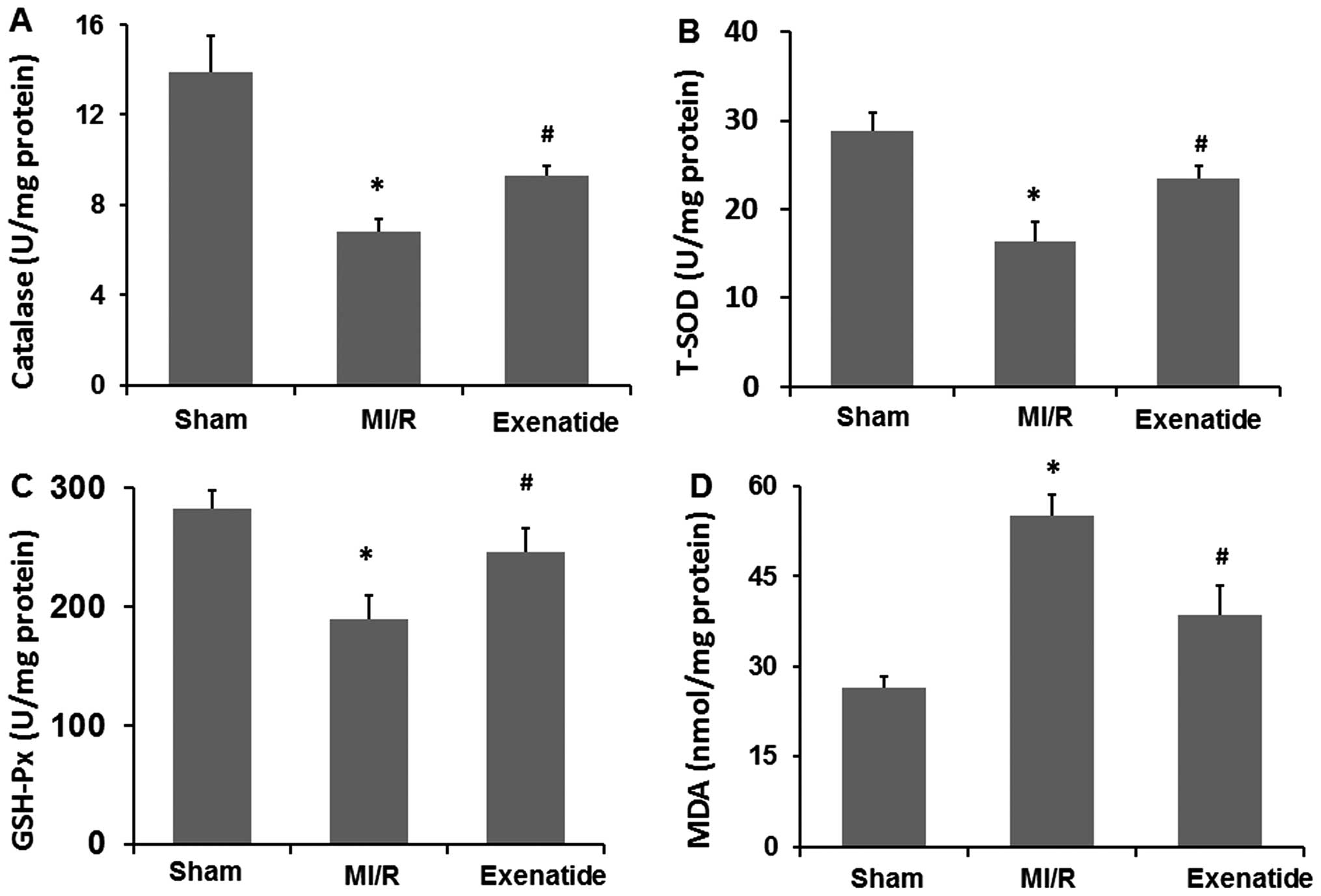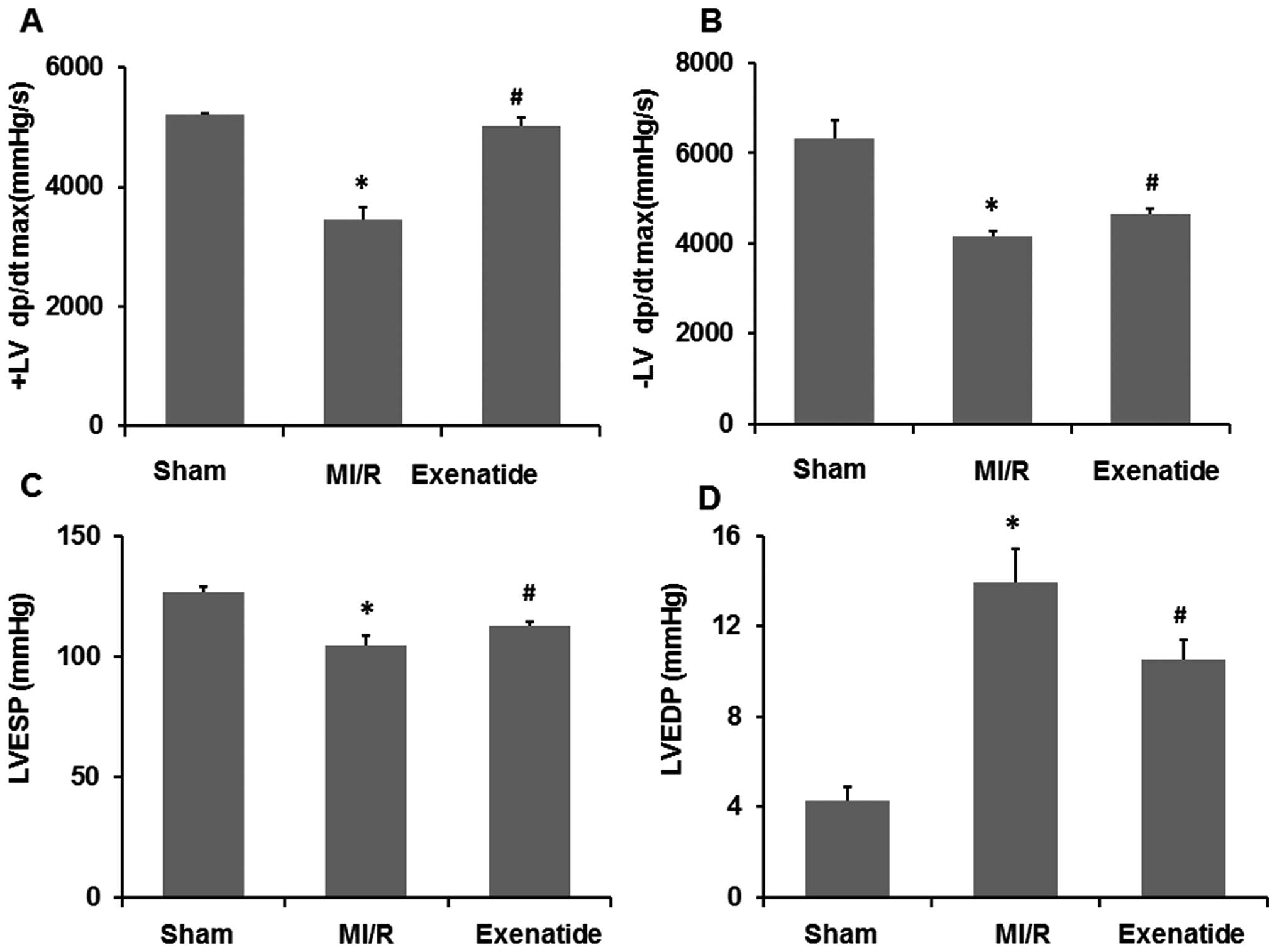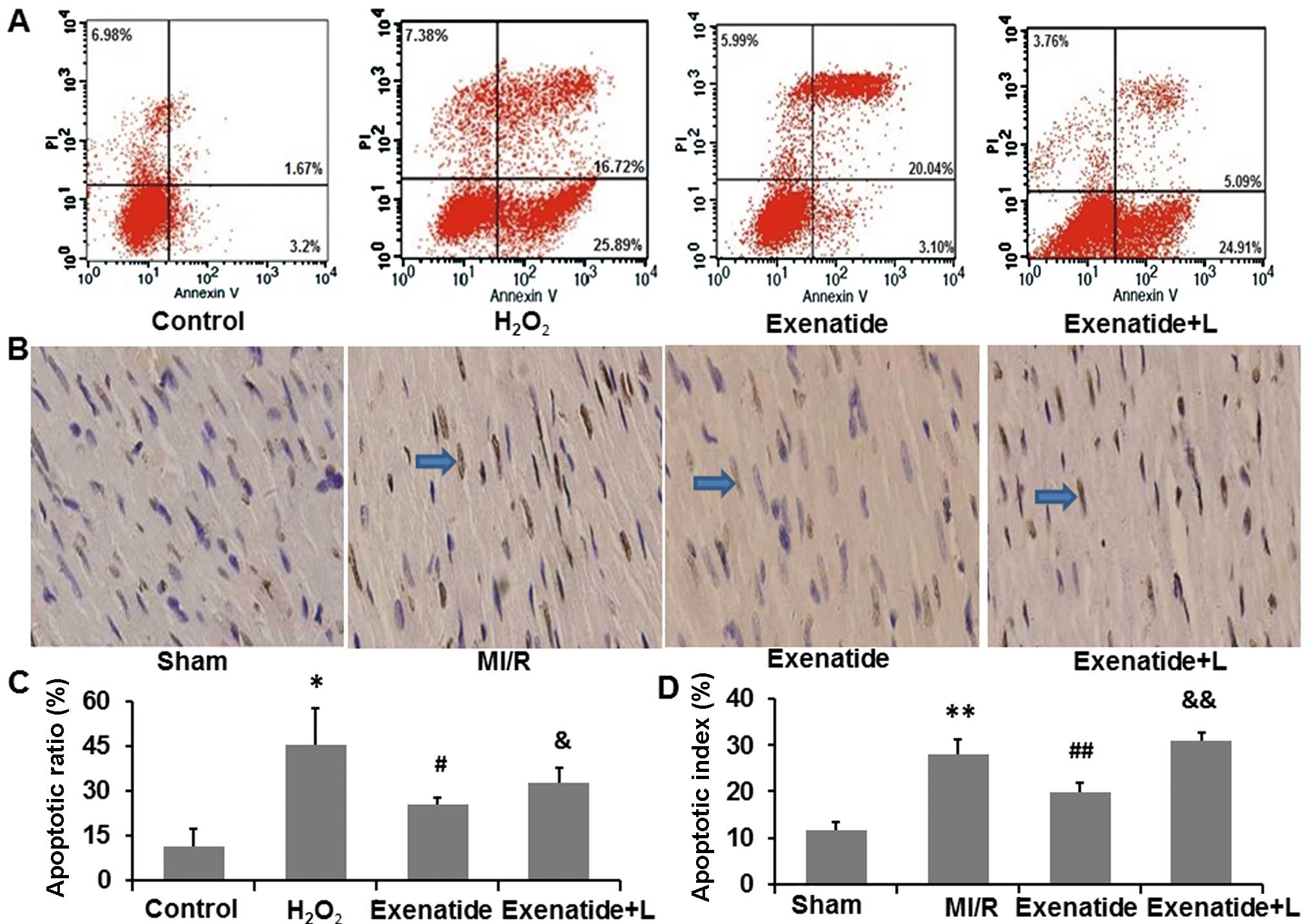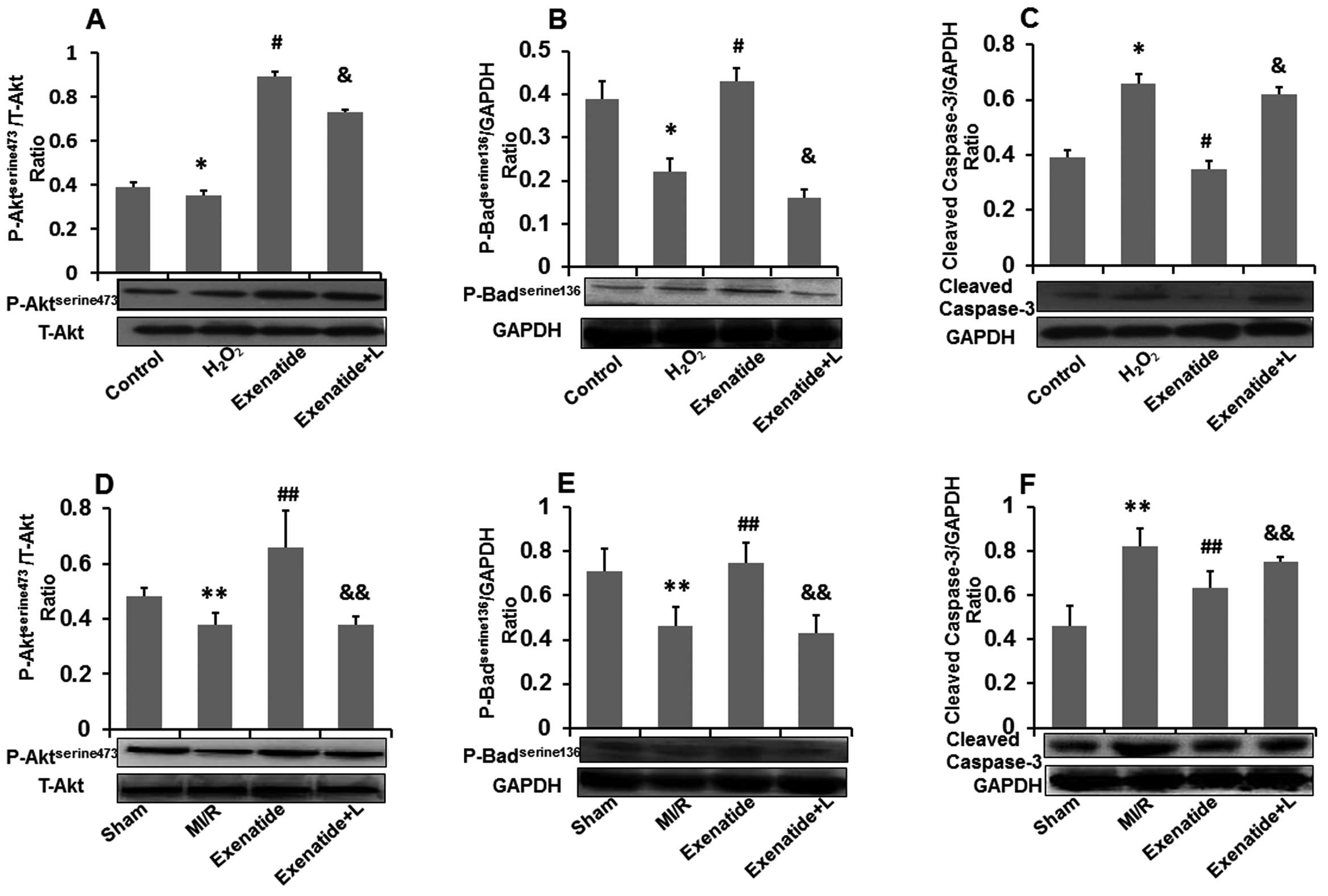|
1
|
Acar E, Ural D, Bildirici U, Sahin T and
Yılmaz I: Diabetic cardiomyopathy. Anadolu Kardiyol Derg.
11:732–737. 2011.
|
|
2
|
Zweier JL and Talukder MA: The role of
oxidants and free radicals in reperfusion injury. Cardiovasc Res.
70:181–190. 2006. View Article : Google Scholar : PubMed/NCBI
|
|
3
|
Zhao ZQ: Oxidative stress-elicited
myocardial apoptosis during reperfusion. Curr Opin Pharmacol.
4:159–165. 2004. View Article : Google Scholar : PubMed/NCBI
|
|
4
|
Gottlieb RA: Cell death pathways in acute
ischemia/reperfusion injury. J Cardiovasc Pharmacol Ther.
16:233–238. 2011. View Article : Google Scholar : PubMed/NCBI
|
|
5
|
Kajstura J, Cheng W, Reiss K, Clark WA,
Sonnenblick EH, Krajewski S, Reed JC, Olivetti G and Anversa P:
Apoptotic and necrotic myocyte cell deaths are independent
contributing variables of infarct size in rats. Lab Invest.
74:86–107. 1996.PubMed/NCBI
|
|
6
|
Palojoki E, Saraste A, Eriksson A, Pulkki
K, Kallajoki M, Voipio-Pulkki LM and Tikkanen I: Cardiomyocyte
apoptosis and ventricular remodeling after myocardial infarction in
rats. Am J Physiol Heart Circ Physiol. 280:H2726–H2731.
2001.PubMed/NCBI
|
|
7
|
Garber AJ: Novel GLP-1 receptor agonists
for diabetes. Expert Opin Investig Drugs. 21:45–57. 2012.
View Article : Google Scholar : PubMed/NCBI
|
|
8
|
Davidson JA: Advances in therapy for type
2 diabetes: GLP-1 receptor agonists and DPP-4 inhibitors. Cleve
Clin J Med. 76(Suppl 5): S28–S38. 2009. View Article : Google Scholar : PubMed/NCBI
|
|
9
|
Lorber D: GLP-1 receptor agonists: effects
on cardiovascular risk reduction. Cardiovasc Ther. Jul
30–2012.(Epub ahead of print).
|
|
10
|
Mundil D, Cameron-Vendrig A and Husain M:
GLP-1 receptor agonists: a clinical perspective on cardiovascular
effects. Diab Vasc Dis Res. 9:95–108. 2012. View Article : Google Scholar : PubMed/NCBI
|
|
11
|
Chiquette E, Toth PP, Ramirez G, Cobble M
and Chilton R: Treatment with exenatide once weekly or twice daily
for 30 weeks is associated with changes in several cardiovascular
risk markers. Vasc Health Risk Manag. 8:621–629. 2012.PubMed/NCBI
|
|
12
|
Timmers L, Henriques JP, de Kleijn DP,
Devries JH, Kemperman H, Steendijk P, Verlaan CW, Kerver M, Piek
JJ, Doevendans PA, Pasterkamp G and Hoefer IE: Exenatide reduces
infarct size and improves cardiac function in a porcine model of
ischemia and reperfusion injury. J Am Coll Cardiol. 53:501–510.
2009. View Article : Google Scholar : PubMed/NCBI
|
|
13
|
Laviola L, Leonardini A, Melchiorre M,
Orlando MR, Peschechera A, Bortone A, Paparella D, Natalicchio A,
Perrini S and Giorgino F: Glucagon-like peptide-1 counteracts
oxidative stress-dependent apoptosis of human cardiac progenitor
cells by inhibiting the activation of the c-Jun N-terminal protein
kinase signaling pathway. Endocrinology. 153:5770–5781. 2012.
View Article : Google Scholar
|
|
14
|
Ravassa S, Zudaire A, Carr RD and Díez J:
Antiapoptotic effects of GLP-1 in murine HL-1 cardiomyocytes. Am J
Physiol Heart Circ Physiol. 300:H1361–H372. 2011. View Article : Google Scholar : PubMed/NCBI
|
|
15
|
Younce CW, Burmeister MA and Ayala JE:
Exendin-4 attenuates high glucose-induced cardiomyocyte apoptosis
via inhibition of endoplasmic reticulum stress and activation of
SERCA2a. Am J Physiol Cell Physiol. 304:C508–C518. 2013. View Article : Google Scholar
|
|
16
|
Kumar S, Kain V and Sitasawad SL: High
glucose-induced Ca2+ overload and oxidative stress
contribute to apoptosis of cardiac cells through mitochondrial
dependent and independent pathways. Biochim Biophys Acta.
1820:907–920. 2012.
|
|
17
|
Fishbein MC, Meerbaum S, Rit J, Lando U,
Kanmatsuse K, Mercier JC, Corday E and Ganz W: Early phase acute
myocardial infarct size quantification: validation of the triphenyl
tetrazolium chloride tissue enzyme staining technique. Am Heart J.
101:593–600. 1981. View Article : Google Scholar
|
|
18
|
Loesser KE, Kukreja RC, Kazziha SY, Jesse
RL and Hess ML: Oxidative damage to the myocardium: a fundamental
mechanism of myocardial injury. Cardioscience. 2:199–216.
1991.PubMed/NCBI
|
|
19
|
Suzuki K, Murtuza B, Sammut IA, Latif N,
et al: Heat shock protein 72 enhances manganese superoxide
dismutase activity during myocardial ischemia-reperfusion injury,
associated with mitochondrial protection and apoptosis reduction.
Circulation. 106:I270–I276. 2002.
|
|
20
|
Peng X and Li Y: Induction of cellular
glutathione-linked enzymes and catalase by the unique
chemoprotective agent, 3H-1,2-dithiole-3-thione in rat
cardiomyocytes affords protection against oxidative cell injury.
Pharmacol Res. 45:491–497. 2002. View Article : Google Scholar
|
|
21
|
Li C, Liu Z, Tian J, Li G, Jiang W, Zhang
G, Chen F, Lin P and Ye Z: Protective roles of Asperosaponin VI, a
triterpenesaponin isolated from Dipsacusasper Wall on acute
myocardial infarction in rats. Eur J Pharmacol. 627:235–241. 2010.
View Article : Google Scholar : PubMed/NCBI
|
|
22
|
Li J, Shao ZH, Xie JT, Wang CZ,
Ramachandran S, Yin JJ, Aung H, Li CQ, Qin G, Vanden Hoek T and
Yuan CS: The effects of ginsenoside Rb1 on JNK in oxidative injury
in cardiomyocytes. Arch Pharm Res. 35:1259–1267. 2012. View Article : Google Scholar : PubMed/NCBI
|
|
23
|
Jin HB, Yang YB, Song YL, Zhang YC and Li
YR: Protective roles of quercetin in acute myocardial ischemia and
reperfusion injury in rats. Mol Biol Rep. 39:11005–11009. 2012.
View Article : Google Scholar : PubMed/NCBI
|
|
24
|
Cai Y, Hu X, Yi B, Zhang T and Wen Z:
Glucagon-like peptide-1 receptor agonist protects against
hyperglycemia-induced cardiocytes injury by inhibiting high
mobility group box 1 expression. Mol Biol Rep. 39:10705–10711.
2012. View Article : Google Scholar : PubMed/NCBI
|
|
25
|
Fontes JP, Gonçalves M and Ribeiro VG:
Serum markers for ischemic myocardial damage. Rev Port Cardiol.
18:1129–1136. 1999.(Portuguese).
|
|
26
|
Xie Y, Wang SX, Sha WW, Zhou X, Wang WL,
Han LP, Li DQ and Yu DM: Effects and mechanism of glucagon-like
peptide-1 on injury of rats cardiomyocytes induced by
hypoxia-reoxygenation. Clin Med J. 121:2134–2138. 2008.PubMed/NCBI
|
|
27
|
Chinda K, Chattipakorn S and Chattipakorn
N: Cardioprotective effects of incretin during
ischaemia-reperfusion. Diab Vasc Dis Res. 9:256–269. 2012.
View Article : Google Scholar : PubMed/NCBI
|
|
28
|
Khalil PN, Neuhof C, Huss R, Pollhammer M,
Khalil MN, Neuhof H, Fritz H and Siebeck M: Calpain inhibition
reduces infarct size and improves global hemodynamics and left
ventricular contractility in a porcine myocardial
ischemia/reperfusion model. Eur J Pharmacol. 528:124–131. 2005.
View Article : Google Scholar
|
|
29
|
Hausenloy DJ and Yellon DM: New directions
for protecting the heart against ischaemia-reperfusion injury:
targeting the reperfusion injury s alvage kinase (RISK)-pathway.
Cardiovasc Res. 61:448–460. 2004. View Article : Google Scholar : PubMed/NCBI
|
|
30
|
Mullonkal CJ and Toledo-Pereyra LH: Akt in
ischemia and reperfusion. J Invest Surg. 20:195–203. 2007.
View Article : Google Scholar : PubMed/NCBI
|
|
31
|
Fujio Y, Nguyen T, Wencker D, Kitsis RN
and Walsh K: Akt promotes survival of cardiomyocytes in
vitro and protects against ischemia-reperfusion injury in mouse
heart. Circulation. 101:660–667. 2000.PubMed/NCBI
|
|
32
|
Matsui T, Tao J, del Monte F, Lee KH, Li
L, Picard M, Force TL, Franke TF, Hajjar RJ and Rosenzweig A: Akt
activation preserves cardiac function and prevents injury after
transient cardiac ischemia in vivo. Circulation.
104:330–335. 2001. View Article : Google Scholar : PubMed/NCBI
|















